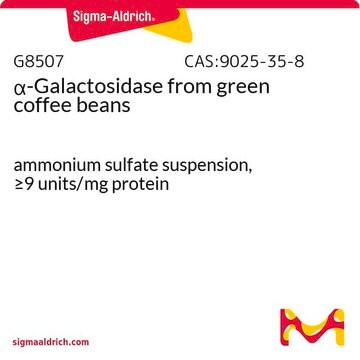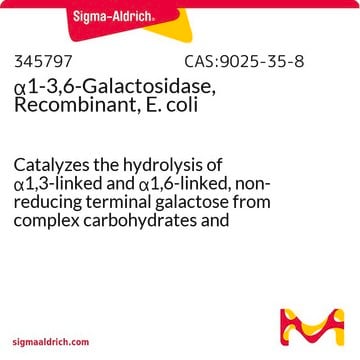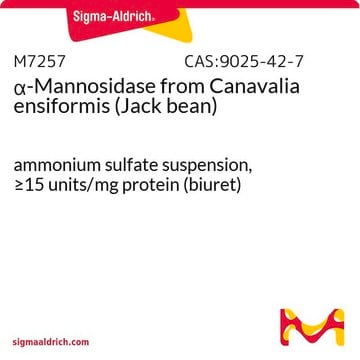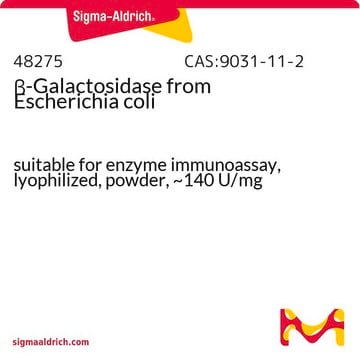G7163
α-Galactosidase, positionally specific from Escherichia coli
recombinant, expressed in E. coli, buffered aqueous solution
Synonym(s):
1,6-alpha-D-galactoside galactohydrolase, alpha-Galactosidase, melibiase
Sign Into View Organizational & Contract Pricing
All Photos(1)
About This Item
CAS Number:
MDL number:
UNSPSC Code:
12352204
NACRES:
NA.32
Recommended Products
recombinant
expressed in E. coli
Quality Level
form
buffered aqueous solution
specific activity
≥20 units/mg protein
mol wt
80 kDa
shipped in
wet ice
storage temp.
2-8°C
Gene Information
Escherichia coli CFT073 ... melA(1037886)
Related Categories
Biochem/physiol Actions
Cleaves α(1→3)- and α(1→6)-linked, non-reducing terminal galactose from complex carbohydrates and glycoproteins. It is particularly efficient for removing α-linked galactose under conditions where the pH must be neutral or above, for example, with live cells.
Unit Definition
One unit will hydrolyze 1 μmole of p-nitrophenyl α-D-galactopyranoside per min at pH 6.5 at 25 °C.
Physical form
This product is a sterile-filtered aqueous buffered solution.
inhibitor
Product No.
Description
Pricing
substrate
Storage Class Code
12 - Non Combustible Liquids
WGK
WGK 2
Flash Point(F)
Not applicable
Flash Point(C)
Not applicable
Certificates of Analysis (COA)
Search for Certificates of Analysis (COA) by entering the products Lot/Batch Number. Lot and Batch Numbers can be found on a product’s label following the words ‘Lot’ or ‘Batch’.
Already Own This Product?
Find documentation for the products that you have recently purchased in the Document Library.
Customers Also Viewed
K Schmid et al.
European journal of biochemistry, 67(1), 95-104 (1976-08-01)
The utilization by Escherichia coli K12 of raffinose as sole carbon source depends on a new raffinose transport system, an invertase and an alpha-galactosidase specified by the Raf-plasmid D1021. The alpha-galactosidase was purified to homogeneity from a mutant strain with
Shuo Gao et al.
Frontiers in chemistry, 9, 709581-709581 (2021-08-03)
For wide applications of the lacZ gene in cellular/molecular biology, small animal investigations, and clinical assessments, the improvement of noninvasive imaging approaches to precisely assay gene expression has garnered much attention. In this study, we investigate a novel molecular platform
Junpei Zhou et al.
Journal of microbiology and biotechnology, 22(11), 1532-1539 (2012-11-06)
The α-galactosidase-coding gene agaAJB13 was cloned from Sphingomonas sp. JB13 showing 16S rDNA (1,343 bp) identities of < or =97.2% with other identified Sphingomonas strains. agaAJB13 (2,217 bp; 64.9% GC content) encodes a 738-residue polypeptide (AgaAJB13) with a calculated mass
Xiao-Liang Pan et al.
The journal of physical chemistry. B, 117(2), 484-489 (2012-12-20)
The enzyme α-galactosidase (α-GAL), a member of glycoside hydrolase family 27, catalyzes the removal of a nonreducing terminal α-galactose residue from polysaccharides, glycolipids, and glycopeptides. α-GAL is believed to have the double displacement retaining reaction mechanism. In this work, the
M Benelmekki et al.
Colloids and surfaces. B, Biointerfaces, 101, 370-375 (2012-09-27)
Biomagnetic immobilization of histidine-rich proteins based on the single-step affinity adsorption of transition metal ions continues to be a suitable practice as a cost effective and a up scaled alternative to the to multiple-step chromatographic separations. In our previous work
Our team of scientists has experience in all areas of research including Life Science, Material Science, Chemical Synthesis, Chromatography, Analytical and many others.
Contact Technical Service










